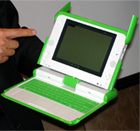Negroponte's laptop plan moves closer to reality

Nicholas Negroponte is a man on a mission. As Chairman of the One Laptop per Child program (OLPC), he has big plans ahead of him: to help eliminate poverty through education, via US$100 laptops distributed to the world's poorest children.
He's also a very busy man. Negroponte hasn't spent more than two consecutive nights in any country since 2005 as he works on the OLPC project and meets with heads of states throughout the world with one goal in mind.
"It's about eliminating poverty ... that's why we do it", Negroponte said. He believes that through education, poverty can be eliminated (and at the least, you cannot eliminate poverty without education).
The OLPC program hopes to improve education through -- as he puts it -- learning about learning itself. He believes that by using computers, children can learn through methods that aren't dependant on teachers. "That is a very small fraction of learning," Negroponte said.
He highlighted the need for an alternative by pointing out that in some parts of the world up to one-third of teachers don't show up to school (or show up drunk). The program hopes to empower children to teach themselves, rather than depending on schools and to make them more responsible for their own education.
Negroponte showed off a working model -- manufactured by Quanta (which make 37 - 38 percent of the world's laptops) -- at the NetEvents Global Press Summit in Hong Kong on Saturday, which is the first time it's been shown to the media (see image below). Quanta agreed to be a part of the program in December last year. As a result, Negroponte says the "if" has gone away.

Because of the lack of a suitable communication infrastructure in developing countries, the laptop uses a Wi-Fi mesh network. This ad hoc LAN is always on, even when the PC is powered down, allowing it to route traffic to other connected computers. If the battery power gets below 15 percent however, it will shut off.
Negroponte describes this part of the program as a "flowerbox theory" for the telecommunication industry, likening it to people in Switzerland putting flowerboxes outside their windows -- the collective benefit is greater than the effort that it takes an individual to create it. The "mesh will cohabitate with [telecommunication] carriers", the same way as flowerboxes cohabitate with community parks and gardens.
There are also plans to provide participating schools with a server (boasting 30GB storage with a cost of US$100) through the program, though no specifics were mentioned.
To date, six countries plan to be part of the program at launch: Argentina, Brazil, Libya, Nigeria, Thailand and Pakistan.
Discussions are continuing with China, Turkey, Mexico, Bangladesh, Palestine, Uruguay, and the Organisation of Central American States (which includes Costa Rica, El Salvador, Guatemala, Honduras and Nicaragua).
Neither China nor India have signed up for the program yet. Recently meeting with China's minister of education (who is responsible for 220 million primary and secondary students), Negroponte pointed out that buying US$100 laptops for that many children is a staggering thought. There are other issues too, such as China and India's belief that they don't need his help, to which Negroponte says: "Nationalism is a disease ... you've got to get rid of it".
But the regime in China isn't really the underlying issue for Negroponte. He describes it as a "Confucius" philosophy: A deeper cultural aspect that most Chinese don't have a deep "faith" in their children. He believes that they're capable of doing a lot more than what they're given credit for.
China and India aren't the only big names that OLPC is up against. When it comes to Microsoft, Negroponte says "they have a genuine issue with open source ... they struggle with it ... it's their issue". While the laptop will run on Linux, it will support an unspecified flavour of Windows. Negroponte -- who has known Bill Gates for his entire adult life -- has also added an SD card slot to the laptop at Gates's request.
According to a recent New York Times article, "Bill Gates, Microsoft's chairman and a leading philanthropist for the third world, has questioned whether the concept is 'just taking what we do in the rich world' and assuming that that is something good for the developing world, too."
In contrast, "Intel's issue is less genuine". Negroponte approached Intel to make their chip first, but they turned it down, so he went to AMD who accepted the offer in less than three hours.
Despite being turned down, he's not bitter about Intel. He describes having Intel's Classmate product on the market as "great" (pointing out that OLPC isn't on the market).
While the laptops are likely to cost US$148 each, when launched in 2007, the price is expected to drop to the US$100 target price by the end of 2008 and may go as low as US$50 price by 2010.
On the topic of finances, Negroponte says "we're effectively a start-up". Financial arrangements are outsourced, with the banks (such as partner Citibank) dealing directly with involved countries and vendors.
The program is to be funded initially by federal governments, though Negroponte plans for funding to come from other sources in the future, including countries sponsoring other countries, child-to-child funding, commercial subsidies and micro-philanthropy.
Despite the obvious benefits, there is the potential that the laptops may fall into the wrong hands. Negroponte responds by saying that if you can create no market for the product, there won't be any incentive to sell it on -- the laptops will never be sold commercially.
Negroponte uses the example that a US postal truck has never been stolen in the world. It doesn't matter what colour you paint it, it still looks like a postal truck. With this in mind, security precautions have gone into the unique looking laptop. If a laptop is stolen before arriving at a school it is totally useless. Additionally if it is stolen from a child it will be disabled after a certain period of time (which will be determined by individual countries). And as only students and teachers will be entitled to own one, it will look a bit odd if they are used by someone else.
But isn't it possible for a country such as Pakistan to lash a bunch together and make a supercomputer? Negroponte's response is -no", because OLPC holds the key that allows access to each laptop. Though they could theoretically remove components from a machine.
When it comes to support from the telecommunication industry, Negroponte (who is a board member at Motorola) has had mixed success, which according to him is controlled by carriers, not mobile manufacturers.
BT has been the most enthusiastic carrier to support the program, to date. Negroponte says "their enthusiasm is boundless". Vodafone has been harder to deal with due to their operations being more autonomous in each country, and he's even been referred to by Telefonica as a "telecommunications terrorist".
Perhaps this is because Negroponte wants the telcos to share their towers with his program, to which he adds that "they don't necessarily represent the consumers to say the least". Thought despite some opposition, he says he isn't a persona non grata within the industry, at least not yet.
While the laptop is designed for ages six to 16, it is tilted towards younger children. A possible future black model has been suggested to "lift the age up" for older children.
Although the target audience is younger than most traditional laptop users, Negroponte assures us that "this is a real computer", with the goal to make it "very, very high end. [There's] nothing cheap about this laptop." If so, it sounds like it will be designed better than his existing one: "My computer crashes five times a day ... it's a battle".
He believes part of the problem is the innate behaviour of programmers to constantly add more features to programs. Negroponte declares that "every single software release has been worse than its predecessor", adding that the version of Word that he uses is so old that it's not supported anymore. However "the Linux community is no better ... [it's] the entire software community".
The laptop on hand wasn't the final version, but the planned specifications are rather impressive, given the minimal budget:
- 500Mhz AMD x86 processor
- 128Mb DRAM
- 512Mb flash memory (No hard disk drive)
- SD Card slot
- Runs on 2 watts of power (15 - 20x less than current laptops) -- charged manually
- 3 USB ports
- stereo sound -- 2 audio outs
- 802.11s Wi-Fi mesh network
- Rugged design
- dual mode display (transmissive and reflective -- the display reflects sunlight so you can see it in broad daylight.)
- built-in camera
- video support
- support for 5-6 languages
Luke Anderson travelled to the NetEvents Global Press Summit in Hong Kong as a guest of NetEvents.